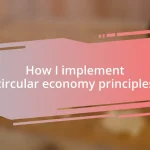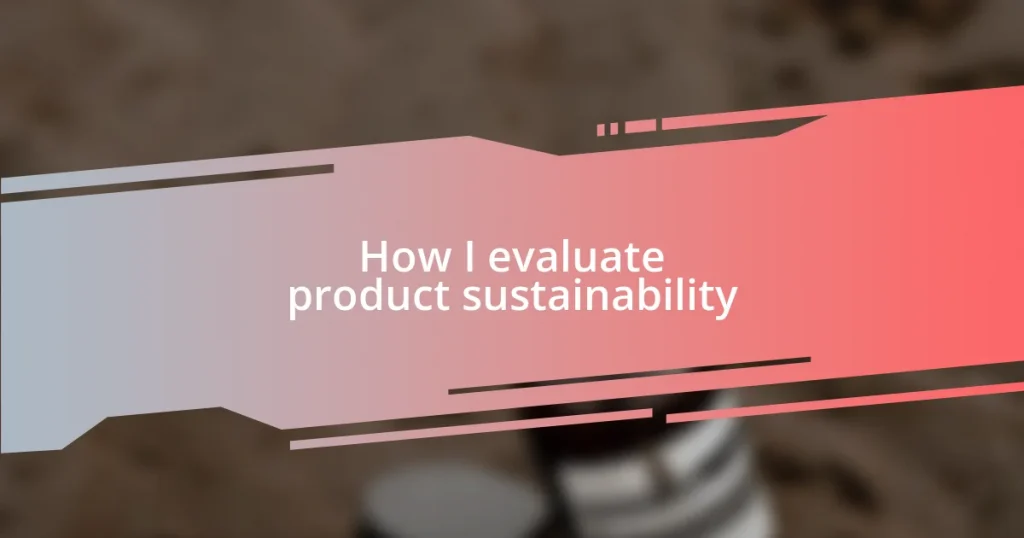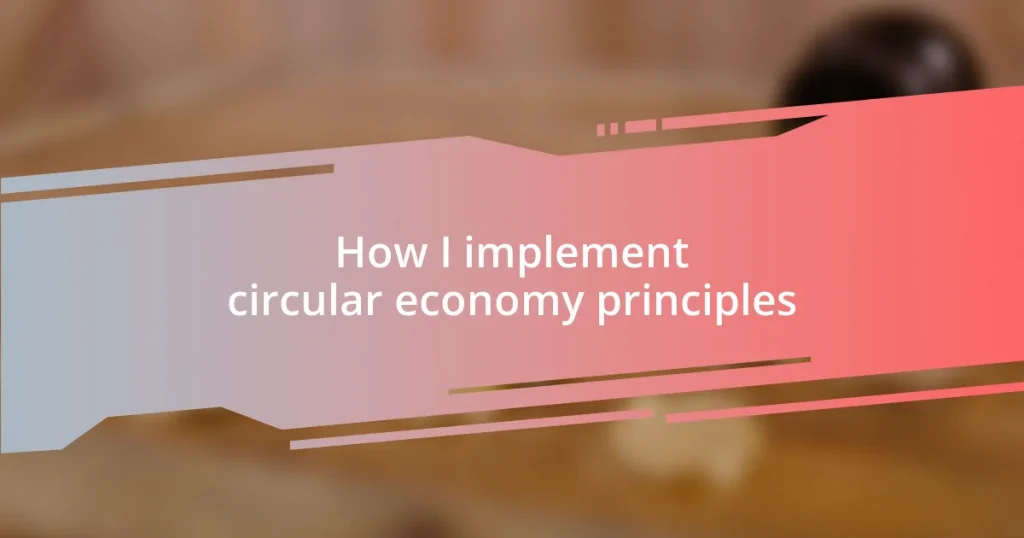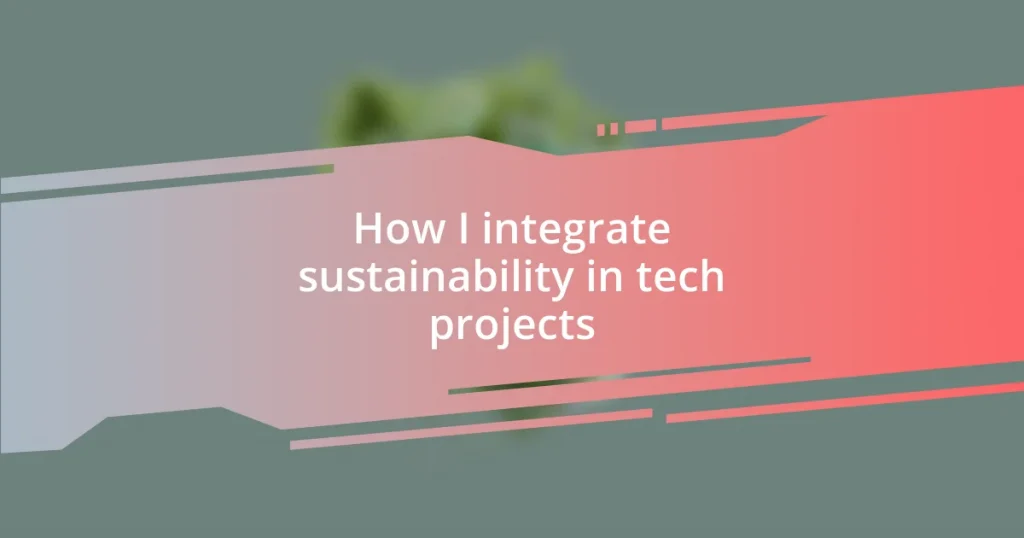Key takeaways:
- Self-discipline and time management are crucial for reducing stress and maximizing online learning potential.
- Identifying personal learning styles (visual, auditory, kinesthetic, read/write) enhances study effectiveness.
- Engaging with peers and instructors fosters collaboration, sparking new ideas and deepening understanding in online education.

Understanding online learning processes
Understanding online learning processes requires a deep dive into various components that contribute to effective learning. When I first transitioned to online education, I remember feeling overwhelmed by the array of tools and platforms. Have you ever felt like there are just too many options? It took me some time to find what truly worked for me.
One of the pivotal moments in my online learning journey was realizing the importance of self-discipline and time management. I often found myself juggling multiple tasks, leading to stress and frustration. I began to appreciate that setting a consistent schedule not only reduced my anxiety but also maximized my learning potential. Isn’t it fascinating how a structured approach can transform our experience?
The online learning process also highlights the value of interaction and feedback. I recall a project where I collaborated with peers from different parts of the world. The exchange of ideas invigorated my learning and made the experience more enriching. How do you feel about the role of community in online learning? For me, it became clear that engaging with others is vital to deepen understanding and stay motivated.

Identifying personal learning styles
Identifying my personal learning style was a game changer for my online education. Initially, I was unsure if I was a visual, auditory, or kinesthetic learner. After experimenting with various resources—like watching videos, listening to podcasts, or engaging in hands-on projects—I discovered that I thrived on visual aids. It was like a light bulb went off! Visual representations helped me grasp complex concepts much more efficiently.
Here are some indicators to help you identify your learning style:
- Visual learners often prefer diagrams, charts, and written instructions.
- Auditory learners benefit from lectures and discussions.
- Kinesthetic learners excel when engaging in hands-on exploration.
- Read/write learners favor reading and writing tasks for better retention.
Knowing your learning style can pave the way for a more effective study routine. Ultimately, self-awareness can help tailor your online learning experience to suit your needs.

Setting clear learning goals
Setting clear learning goals has been essential in my online learning journey. When I first started, I tended to dive into courses without much thought about what I really wanted to achieve. I remember one time, I signed up for a programming course, excited but without a concrete purpose. It felt overwhelming, and I quickly lost motivation. Once I began setting specific, measurable goals, it became much easier to track my progress and stay focused.
Having clear goals not only clarifies my learning path but also fuels my motivation. I started to break down my larger objectives—like mastering a new software—into smaller, achievable tasks. This approach transformed my experiences; instead of feeling like I was lost in a sea of information, I felt like I was navigating a well-marked path. What’s more rewarding than checking off those goals? I often found myself celebrating small victories, which made the learning process feel less daunting.
Moreover, I realized the importance of revisiting and adjusting my goals regularly. It’s not unusual for priorities to shift. For example, I initially aimed to complete a course in a month, but then life got busy. By reassessing my timeline and modifying my objectives, I was able to create a realistic plan that kept my motivation intact, rather than feeling defeated.
| Benefits of Setting Clear Learning Goals | Challenges without Clear Goals |
|---|---|
| Increased motivation through measurable achievements | Feelings of overwhelm and confusion |
| Defined path to track progress | Difficulty in recognizing what to focus on |
| Ability to reassess and adjust objectives | Lack of direction leading to loss of interest |

Creating an effective study environment
Creating an effective study environment has been crucial for my success in online learning. I quickly learned that a cluttered desk equates to a cluttered mind. Once, I tried studying amidst a mess of papers and old coffee cups, and it was nearly impossible to concentrate. When I finally took time to declutter, I felt a sense of relief wash over me. Suddenly, the focus came naturally, as my surroundings transformed into a space that fostered productivity.
Lighting also plays a significant role in my study space. I remember trying to power through a particularly challenging module in dim light one evening. My eyes were straining, and I felt lethargic. After switching to brighter, softer lighting, I noticed an instant boost in my energy and focus. Could something as simple as lighting make such a difference? For me, it absolutely did. Now, I always ensure my space is well-lit, as it enhances my alertness and helps me absorb information much better.
Lastly, adding personal touches to my study environment has made it feel more inviting. I’ve set up a small corner with my favorite plants and motivational quotes. Every time I sit down to study, those elements inspire me and remind me of my broader goals. This emotional connection to my space makes me more invested in my learning. Have you ever thought about how your environment influences your mindset? I’m convinced that a few thoughtful changes can make online learning not just effective, but enjoyable as well.

Utilizing online resources efficiently
Using online resources efficiently has been a game changer for me. I remember the first time I stumbled upon a platform with countless free resources, videos, and articles. At first, I felt overwhelmed by the sheer volume of information; it was like stepping into a library without a guide. It wasn’t until I learned to curate my resources by choosing the most relevant and credible ones that I started to see real progress. I began prioritizing quality over quantity, focusing on a few trusted sources rather than trying to digest everything available.
Another strategy that has incredibly boosted my online learning is creating a resource library. I started bookmark folders categorizing articles, videos, and tutorials on topics I wanted to explore. Each time I made a breakthrough or learned something new, I’d add it to my curated collection. It felt empowering to have my own tailored library. Have you ever thought about how satisfying it is to have everything organized at your fingertips? It not only makes accessing information quicker but also fosters a sense of ownership over my learning journey.
Lastly, I’ve found that engaging with online learning communities can amplify my use of resources. I recall joining a forum where members shared their favorite resources, tips, and insights. The discussions were enlightening and often introduced me to hidden gems I wouldn’t have found on my own. It’s fascinating how collaborative learning can expand your perspective, isn’t it? Connecting with others not only enriches my understanding but also keeps me motivated to keep exploring the vast world of online resources.

Engaging with peers and instructors
Engaging with peers and instructors has been essential in my online learning experience. One memorable moment was during a group project where we all met virtually to brainstorm ideas. As we shared our thoughts, I felt a wave of enthusiasm wash over the group. Hearing different perspectives not only opened my eyes to new approaches but also made the learning process feel more vibrant. Isn’t it incredible how collaboration can spark fresh ideas and motivate us to think differently?
Moreover, I’ve discovered that reaching out to instructors has been just as impactful. Early on, I hesitated to send emails asking questions, fearing it might seem trivial. Yet, when I finally took the plunge, I was amazed at the thoughtful responses I received. One instructor even took the time to discuss my questions over a video call, providing insights that transformed my understanding of the subject. Have you ever hesitated to engage, thinking it wouldn’t matter? I can assure you, it does. Those moments of direct interaction not only clarified my doubts but also fostered a sense of connection that enhanced my learning.
Furthermore, I find that participating in discussion forums adds another layer of engagement. I recall a lively debate over a topic that initially felt boring to me. As I read others’ passionate arguments and experiences, my interest piqued, and I found myself contributing my thoughts, too. The camaraderie formed in those discussions was palpable, pushing me out of my comfort zone and encouraging deep learning. Have you experienced that rush of connection through shared dialogues? It’s remarkable how engaging with others can transform a seemingly mundane topic into an exciting learning adventure.

Evaluating and adjusting learning strategies
Evaluating and adjusting learning strategies is vital for continuous improvement. I vividly recall a particular course where I was struggling with the pace of the content. Instead of just persevering, I took time to reflect on my study habits. I adjusted my schedule to focus on dedicated study blocks, and just like that, my understanding deepened. Have you ever noticed how a little tweak in your schedule can yield significant results?
Sometimes, I find that simply switching my study environment can make a world of difference. I remember one week when I moved my study sessions from my desk to a cozy café. The change in atmosphere ignited my motivation and creativity, resulting in a productive week. Isn’t it fascinating how our surroundings can impact our learning? Experimenting with varying locations helped me identify what conditions allow me to thrive.
I also believe in the power of feedback loops. After submitting assignments, I always pay close attention to the feedback I receive. There was a time when I received constructive criticism on a written assignment. Instead of feeling disheartened, I viewed it as an opportunity to grow. I made a conscious effort to incorporate the advice into my subsequent work, which dramatically improved my grades. Have you ever considered how feedback can refine your skills? I can’t stress enough how valuable evaluating and adjusting based on feedback has been in my learning journey.















